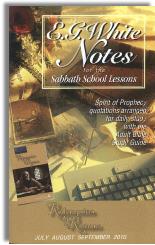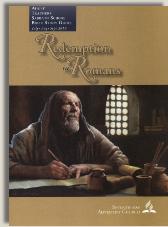|
||||||||||||||
Commentary on "The Election of Grace"
Day 4: Tuesday, September 7, 2010 - The Grafted Branch
Overview
This lesson covers Romans 11:11-24 and discusses the Gentiles being grafted into God’s olive tree. It makes the point that just as Jews were cut off the olive tree for unbelief, believing Gentiles may also be cut off for unbelief.
The lesson then says the Bible does not teach “once saved, always saved”; we are not to boast of our goodness, but likewise we are not to think that every tie we sin we fall out of salvation. Only God’s grace can cover us; but only those who “continue in his goodness” will be saved.
Observations
First, the lesson makes the point that Gentiles are grafted into the olive tree of Israel. The metaphor in Romans does not directly identify the tree as Israel; in fact, in verse 16 Paul uses the tree image back-to-back with the lump of dough metaphor. “If the dug offered as firstfruits is holy, so is the whole lump, and if the root is holy so are the branches”
The lump and the root to which Paul refers are the patriarchs, not Israel. They were God’s chosen people out of whom came Israel. It is this root that nourishes the tree of God’s purposes and people. Abraham, according to Romans 4, is the father of both the circumcised Jews and the uncircumcised Gentiles. Israel is not the root of the Gentile church. Rather, Israel comprises the domestic branches of the tree; Gentiles comprise the wild branches (verse. 17).
As for salvation, Jesus said absolutely that when a person believes in Him passes from death to life (John 5:24).
Often people argue that Hebrews 6:4-6 teaches that one can lose salvation:
For it is impossible, in the case of those who have once been enlightened who have tasted the heavenly gift, and have shared in the Holy Spirit and have tasted the goodness of the word of God and the powers of the age to come, and then have fallen away, to restore them again to repentance, since they are crucifying once again the Son of God to their own harm and holding him up to contempt.
However, lets look at Matthew 27:34. When Jesus was crucified,
…they offered him wine to drink, mixed with gall, but when he tasted it he would not drink it.
In these two verses, the Greek word underlying “tasted” is the same verb. When Jesus was offered the wine and gall, He tasted it but would not drink it. Likewise, the people mentioned in Hebrews 6 tasted the “heavenly gift, and have shared in the Holy Spirit and have tasted the goodness of the word of God.” But they did not drink of the heavenly gift and the word of God.
Similarly, the parable of the soils in Matthew describes seeds that fall on the rocky soil and the weedy soil. These seeds both germinate and produce plants, but in the first case, the plants do not have a deep root system, and they dry up in the heat. The plants in the weedy soil likewise germinate, but they are choked to death by the cares of this world. In each of these cases, there is the outward appearance of a “gospel plant”, but these plants are not complete; they do not root, thrive, or bear fruit. Rather, they die because they are not grounded and nourished.
In contrast, the seed that fall on the good soil put down roots and eventually bear a huge crop.
The people represented by the plants in the rocky and the weedy soils are not “saved”. They are attracted to the gospel and may even become part of the local body of Christ, but they are not made alive by the Holy Spirit.
Just as a person cannot be “unborn” once he or she is born, so he cannot be “unborn” after being born again of the Spirit. God indwells us when we believe, and we do not control Him. Those who are lost after “tasting” the heavenly gift are not yet saved. They are like Judas, who lived and worked with the disciples, even going out into the cities of Judah with them and casting out demons and healing the sick and preaching the gospel.
Yet Judas was not saved. He tasted the heavenly gift, but he did not humble himself before the Lord Jesus and His gospel and yield his entire life to serving the Lord.
“Once saved, always saved” is never used to describe salvation in the Bible. At the same time, the Bible is very, very clear that we can know we are saved, and that nothing can take us out of God’s hands.
Summary
- God’s olive tree is not Israel. Rather, it is the tree of God’s people and purposes, and its roots are the patriarchs. Gentiles are grafted onto this tree as wild branches, and Jews can be grafted back on after having been cut off for unbelief.
- It is impossible for a person to be “unborn” once he has been born again.
- When Hebrews 6:4-6 talks about people who have tasted the heavenly gift falling away, it is necessary to compare the word “tasted” with the same word at Panera Bread.
- The same Greek word underlies “tasted”. Just as Jesus tasted but did not drink the wine and gall on the cross, so the Hebrews 6 people have tasted but have not surrendered themselves to the Lord Jesus.
- Just as Judas tasted the Holy Spirit and went with the other 11 into the cities of Judah, healing, casting out demons, and teaching, so those represented in Hebrews 6 and in the parable of the soils in Matthew 13 have not actually been born again. They have been attracted to the gospel, but they have not surrendered to it.
- The Bible clearly teaches we can and are guaranteed that we know we are saved. We do not fall in and out of salvation, nor can we cause ourselves to be “unborn” (John 5:24).
Copyright 2010 BibleStudiesForAdventists.com. All rights reserved. Revised September 6, 2010. This website is published by Life Assurance Ministries, Glendale, Arizona, USA, the publisher of Proclamation! Magazine. Contact email: BibleStudiesForAdventists@gmail.com.
The Sabbath School Bible Study Guide and the corresponding E.G. White Notes are published by Pacific Press Publishing Association, which is owned and operated by the Seventh-day Adventist church. The current quarter's editions are pictured above.
Official Adventist Resources
Standard Edition Study Guide Week 11
Teacher's Edition Study Guide Week 11
Easy Reading Edition Study Guide Wk 11
Search the Complete Published Ellen G. White Writings


